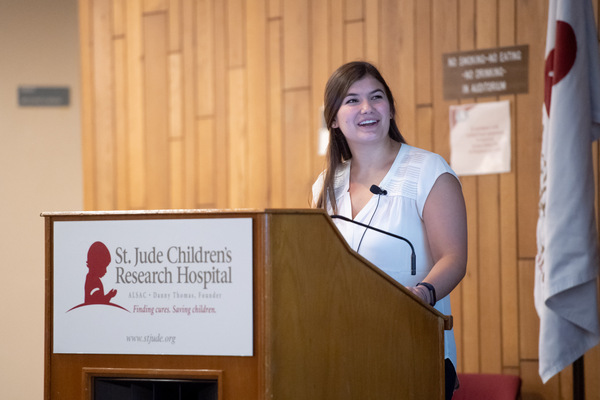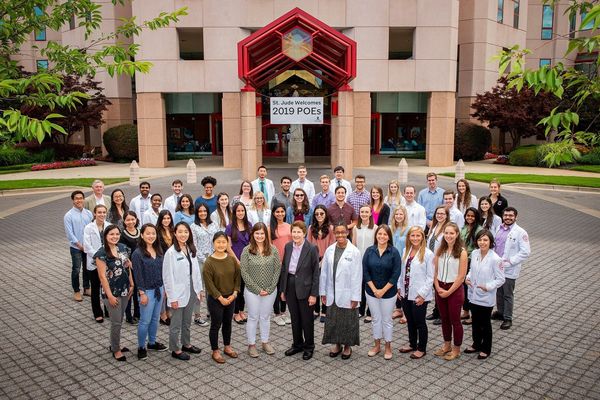
For many pre-med students, meaningful research opportunities are a crucial part of preparing for medical school. One of these students, current senior Maddie Heyn, told us about her summer at St. Jude Children’s Hospital, conducting biostatistics research as part of the Pediatric Oncology Education (POE) program. Maddie is a pre-med Applied Computational Mathematics and Statistics major with a concentration in biology. She is from Greensboro, North Carolina and lived in Flaherty Hall on campus.
Tell us a little about the research you’ve done at Notre Dame.
I haven’t officially done statistical research on campus. I work at the Eck Institute for Global Health which is the global health office on campus, so I help do literature research for them, especially when we do our annual Notre Dame Global Health case competition. Last summer, the summer between my sophomore and junior years, I worked at an immunoparasitology lab in Denmark, which was funded by the Nanovic Institute. When I worked in that lab, it was very interesting and different from what I had done before because they were studying the use of parasites to treat autoimmune conditions.
How did those experiences help you come across the POE Program?
I learned in Denmark that wet lab research is not for me, but that I wanted something more clinically based and focused. When I was looking for summer jobs, I searched on different universities’ websites and saw what they recommended for pre-med students to do in the summer.
What is the POE Program?
The POE program is a research program at St. Jude Children’s Research Hospital that accepts undergraduate and medical students who have some kind of research experience in a variety of different fields. There were 50 of us— about 20 medical students and 30 undergrads—and we were all in different labs. St. Jude is in Memphis, Tennessee, and we all lived together nearby and worked in different departments at St. Jude.

St. Jude 2019 POE interns
Which field did you work in?
I was a biostatistics intern, so I did the statistics for a part of a clinical trial in retinoblastoma, which is a type of eye cancer that you develop as a result (most of the time) of a mutation in the RB1 gene. This is the first tumor suppressor gene to ever be discovered. They know a lot about retinoblastoma. But, what’s interesting is you usually only develop it before five years old. So all of the patients I saw and most of the patients in my dataset were very young. Like one, two, three years old.
Walk us through the other parts of the program.
All of the POE interns lived together, which was a lot of fun. We lived half a mile from the hospital, so they shuttled us back and forth. We were all in different departments, so we all had our own independent research projects. Everyday, we would get together for lunch and it was called the Lunch and Learn series, which is one of the hallmarks of the program. In that, every day Monday to Friday, they feed you lunch and you hear a different speaker.
St. Jude is one of the places that’s known for its renowned research and also for its renowned clinical practice, so you got to meet a lot of doctors and researchers, but also people who take care of management, like the people on the building services team. One day they actually talked to us for an hour about how the airflow in the hospital is pressurized in different ways. Like we walked in through this rotational door and the way it’s pressurized, the air from the outside can’t get into the hospital. So all the little details like that. That was really interesting.
I was also able to go to clinical trial every week. One time, I got to sit in and meet with a family that was signing up to be part of the next clinical trial. I got to see almost every part of the clinical trial process, but then also when I wasn’t in clinic, I was in my office in the biostats department, coding and going through the processes of cleaning data.
So this was an opportunity for you to integrate your ACMS interests with your goal of practicing medicine?
Exactly. It was a good experience because, as an ACMS and biology major, I’ve had those moments of wondering if I would really like biostatistics and thinking maybe that would be a good way for me to be part of the health field. But I learned that, while that part was super interesting, every day I was looking forward to being in clinic and it was definitely more of a patient-centered idea for me. So it was good that I enjoyed my job a lot, but to see that while I enjoyed it, it isn’t necessarily for me.
Do you have an idea what kind of medicine you’ll end up practicing?
Personally, I think I’ll be more interested in clinical practice. I don’t know specifically, but I want to do pediatrics. So that worked really well at St. Jude, not only meeting a lot of pediatric doctors, but being able to work with them. I wanted to be a pediatric oncologist in high school but I’m definitely keeping my options open and seeing what interests me. I loved pediatric oncology and all the doctors I met.
Just to wrap things up, do you have any advice for younger pre-med students?
It’s okay to stress, but know that it will all work out. Seek the appropriate resources if you need them, whether that be going to see a professor, forming tutoring groups or maybe you need to seek help in other places like the University Counseling Center, your family, or maybe in a spiritual way. Let that happen. But also know that if you’re working for something, it will work out. Whether in the way that you expect it to or through the process of learning both about yourself and what you’re interested in, you’ll find where you’re supposed to be in due time.
The POE Program is accepting applications until February 1, 2020. The application can be found here. Interested students are encouraged to reach out to Maddie at mheyn@nd.edu .